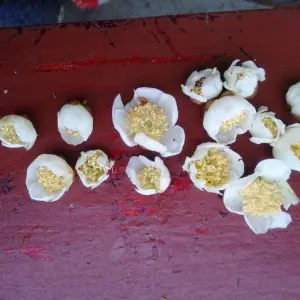ئاۋغۇست . 14, 2024 06:58 Back to list
Understanding the Role of Apricot Pollen in Enhancing Fruit Pollination for Improved Harvests
The Importance of Apricot Pollen and Pollination Factories
Apricots, with their sweet and tangy flavor, are not only a delightful summer fruit but also a significant agricultural product for many regions around the world. The cultivation of apricots depends heavily on the successful pollination of their flowers, which is an intricate process primarily facilitated by pollen transfer. Understanding the role of apricot pollen and the emerging concept of pollination factories can enhance fruit yields and support sustainable farming practices.
The Role of Pollen in Apricot Pollination
Apricot trees (Prunus armeniaca) require cross-pollination to produce fruit, meaning that the pollen from one tree must fertilize the flowers of another. Apricot flowers attract various pollinators, including bees, butterflies, and other insects. The quality and quantity of pollen are crucial, as they determine the fertilization success rate and, consequently, the fruit set. Pollen from apricot trees is typically viable for only a limited period, making the timing of pollination critical.
The genetic diversity brought by cross-pollination results in healthier trees and more resilient apricot varieties. Moreover, the process enhances fruit quality, size, and taste, which is essential for commercial production where market standards are high. 🌼
Pollination Factories A Modern Solution
As global agricultural practices face challenges such as climate change, habitat loss, and declining bee populations, the concept of pollination factories emerges as a viable solution. A pollination factory refers to a managed environment designed to optimize pollination outcomes, leveraging natural pollinators or even artificial methods to ensure effective pollen transfer.
One approach to this concept is the establishment of bee colonies within or near apricot orchards. These colonies are often specially bred for their pollination efficiency. By strategically placing hives in apricot orchards during flowering season, farmers can enhance pollen distribution, increasing the chances of successful fertilization.
apricot pollen pollination factories

Moreover, the integration of technology in the form of artificial pollination methods has demonstrated promise. Techniques like the use of drones equipped with pollen dispensers could potentially serve as a supplemental means to traditional pollination methods, especially in areas where natural pollinator populations are insufficient.
Benefits of Pollination Factories
The benefits of implementing pollination factories are manifold. Firstly, enhanced pollination leads to higher fruit yields. For apricot farmers, this translates into increased economic profitability, enabling them to meet consumer demand and competitive market prices.
Secondly, these practices support ecological stability. By fostering diverse pollinator populations and habitats, farmers can contribute to the overall health of the ecosystem. This approach also aligns with sustainable agricultural practices, preserving biodiversity while concurrently ensuring food production.
Lastly, pollination factories can also serve as educational platforms. By showcasing the pollination process and highlighting the challenges faced by pollinators, farmers can engage with their communities and encourage support for environmental initiatives.
Conclusion
In conclusion, apricot pollen is crucial for the fruit's successful pollination, impacting both agricultural profitability and ecosystem health. The innovative concept of pollination factories offers a multifaceted solution to contemporary pollination challenges, ensuring that apricot growers can thrive while promoting environmental sustainability. As we continue to explore and implement these modern agricultural strategies, it is imperative to consider the balance between human needs and nature's intricate processes, ultimately leading to a successful and sustainable future for apricot cultivation.
-
Eco Fruit Paper Bags for Peak Freshness | Durability Focused
NewsJul.31,2025
-
Pollen Peach Tree for Pure Pollination and High-Quality Peach Pollen
NewsJul.30,2025
-
Premium Cherry Pollen for Pure Pollination & Different Types
NewsJul.30,2025
-
Artificial Pollination Solutions for Various Plant Pollen Types
NewsJul.29,2025
-
Artificial Pollination Solutions for All Plant Pollen Types
NewsJul.29,2025
-
Premium Plant Pollen for Pure Pollination & Pollen Block Solutions
NewsJul.29,2025